Today we travel to a future without lies. What would it be like if we all wore accurate lie detectors around all the time?
In this episode we talk about when children learn to lie, the different social functions of lying, and what might happen if we couldn’t ever fib. How would negotiations be different? How would we make small talk? Could we create art or music? All that and more in this week’s future.
This week’s show features four experts in the different facets of deception. Patti Wood is an expert in detecting non-verbal cues. She told me about her work, and the ways she uses body language to try and tell if someone is lying. Maria Konnikova is a journalist and the author of a book called The Confidence Game, all about con artists and people who are really good at lying. She says that while many of the people her book is about would have been thwarted, there would be serious downsides to not being able to lie to one another. Michael Lewis has studied lying and childhood development for over fifty years, and he says that children learn really early on that lying is something they should be doing. And Andrea Kupfer Schneider is a professor of ethics and dispute resolution at Marquette University Law School. She says that without the ability to lie, negotiations would actually be way better.
Right now there are tons of different technologies and methods that try to detect lying, which range from imperfect to totally bogus. According to the American Psychological Association polygraph tests, the lie detector setup you see in movies and TV all the time, don’t accurately tell if someone is lying. There’s also a device called a voice stress analyzer — what it does is listen to your voice and try to detect signs of stress, which suggests that you might not be telling the truth. But according to a study done by the National Institute of Justice, voice stress analyzers are often no better than chance at detecting lies. Of course, that hasn’t stopped some places from using them surreptitiously during phone interviews.
There are also all kinds of drugs that attempt to make people tell the truth. These are staples of movies and television shows, but like most things they don’t work as well as they do on TV.
If you’re interested in the history of lie detectors, check out this book by Ken Alder, which explores not just who invented the polygraph, but the long history of our obsession with finding a biological connection to “the truth.” And if you’re interested in a movie about a world without lies, try The Invention of Lying.
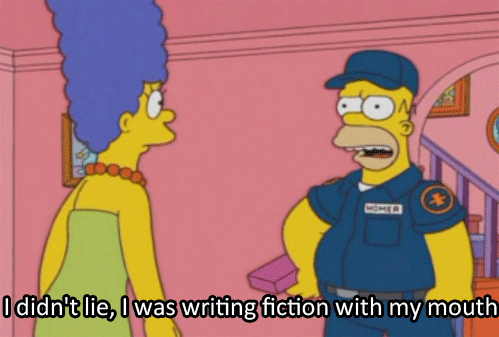
Flash Forward is produced by me, Rose Eveleth, and is part of the Boing Boing podcast family. The intro music is by Asura and the outtro music is by Broke for Free. The episode art is by Matt Lubchansky.
This week’s future voices were provided by Sarah Werner, Brent Rose, Kirstin Butler, Pablo Meier, Eddie Guimont, Guillermo Herrera, Justin Cameron and Jess Zimmerman, who also suggested this future to us, so thanks Jess! If you want to be a voice in the future you can do that, it’s one of the rewards we have for becoming a Patron of the show on Patreon.
If you want to suggest a future we should take on, send us a note on Twitter, Facebook or by email at info@flashforwardpod.com. We love hearing your ideas! And if you think you’ve spotted one of the little references I’ve hidden in the episode, email us there too. If you’re right, I’ll send you something cool.
And, as always, if you like the show please head to iTunes and leave us a nice review or just tell your friends about us. Those things really do help.
See you next week for a new future!
▹▹▹▹▹▹▹▹▹▹▹▹▹▹▹▹▹▹▹▹▹▹▹▹▹▹▹▹▹▹▹▹▹▹▹▹▹▹▹▹▹▹▹▹▹▹▹▹▹▹▹▹▹▹▹▹▹▹▹▹▹▹▹▹▹▹
TRANSCRIPT
Hello! And welcome to Flash Forward. I’m Rose and I’m your host. Flash Forward is a podcast about the future. Every week we take on a different future scenario. Every episode we start with a little trip to a possible tomorrow, before returning to the present to talks to some experts about that future and how it might really go down. Got it? Great.
This week we’re headed to the year 2051.
Dinner background sound
Man: … So really if you calculated it, as he SHOULD HAVE, all the topsoil would have wound up in the oceans after just a few hundred years. It’s so frustrating when writers don’t take scientific accuracy seriously.
Woman: Yeah…
<<BEEP>>
Man: So, you disagree?
Woman: No, I see your point
<<BEEP>>
Man: … Okay what do you really think?
Woman: Well first, if you do the math right it would actually take a few thousand years, not a few hundred. And second, you’re really going to fixate about the soil instability in a book that also involves a two headed hoofed creature that speaks in orchestra music and lives for hundreds of years? It just seems… like an interesting choice.
<<BEEP>
Woman: Like a stupid choice
[walking around restaurant]
Man: And I looked at him, and I said, you should see my wife!!!
[[laughter]]
<<BEEP>
[walking around restaurant]
Woman 1: Hi! It’s so good to see you!
<<BEEP>>
Woman 2: This is a business meeting it’s fine, let’s cut the small talk.
Woman 1: Great.
[door opens and closes into club area]
Club Music
Man1: Hey, can I buy you a drink?
Man2: Oh, no thank you
Man1: Come on, just one drink
Man2: Sorry, I have a boyfriend
<<BEEP>>
Man1: So you don’t have a boyfriend
Man2: I do not want a drink please leave me alone
Man1: Come on, I’m a nice guy
<<BEEP>>
[music fades out]
Rose: So in this future we’ve invented totally accurate lie detectors, and we’ve decided that everybody has to wear them around all the time.
The inability to lie is a really common trope in comedy, cartoons, movies, fables. George Washington famously did not lie about whether he cut down the cherry tree. [[BEEP]] Ironically, that story is actually a lie, made up by one George Washington’s first biographers because he thought the story would help sell books. HE wasn’t wrong about that. But we see this trope, the inability to lie, pop up all over the place.
[Pinnochio clip: https://www.youtube.com/watch?v=hJ3lxzuI_sc]
Rose: In Galaxy Quest, the Thermians can’t understand the concept of lying.
[Galaxy Question clip: https://www.youtube.com/watch?v=-VGajDTNKFU]
Rose: Usually in these scenarios the inability to lie comes from magic, or an alternate reality, or sometimes a head injury. But in our future these are devices, little machines that read us and detect the signs of lying. And that’s not a trivial proposition.
Patti Wood: It would be so wonderful if you could say, oh when he does this you know he’s lying.
Rose: That’s Patti Wood, an expert in non-verbal communication and lie detection.
Wood: I walked in that room, and it was the first day, and I went oh my gosh there is a name for my ability. Because I knew from really probably the age of 4 or 5 that I would be watching people and they’d be saying things with their words but I knew they didn’t really believe what they were saying out loud because I could read their non-verbal communication.
Rose: Wood travels around the country speaking and consulting on how to detect lying in everything from politicians to athletes to CEOs. And she uses non-verbal cues to detect lying, things like
Wood: Right before he answered the question his eyes went closed for about two seconds.
Rose: But here’s the thing about lying and lie detection. So far we have nothing that is 100% accurate.
Maria Konnikova: The bottom line is that there’s no universal sign that signals lying. The truth is when you come across really good liars, be they psychopaths or people who lie professionally, not college students lying on videotape because they’ve been told to lie, a lot of those things go away, and there are no tells be they micro expressions or the way that your voice sounds or flushing or the way that you move your body because there’s no discomfort this is what you do every day, you have so much practice at it and you’re not a liar.
Rose: That’s Maria Konnikova, the author of a book called The Confidence Game, which is all about scams and con artists, basically people who are great at lying.
And she says that while some strategies can be better than random chance at detecting lying, none of them are great at it. According to the American Psychological Association polygraph tests, the lie detector setup you see in movies and TV all the time, don’t accurately tell if someone is lying. There’s also a device called a voice stress analyzer — what it does is listen to your voice and try to detect signs of stress, which suggests that you might not be telling the truth.
Wood: They have those small enough to have them to have them on cell phones and in fact they are on cell phones, not everybody’s but they are on people’s cell phones. So that bodies like, I don’t state that they’re actually existing, but like the FBI or CIA, but these on your phone and tell what you’re saying and whether you’re lying when you say it
Rose: But according to a study done by the National Institute of Justice, voice stress analyzers are often no better than chance at detecting lies.
Then there’s the whole emerging field of research that uses brain imaging to try and detect lies.
Konnikova: The thing that people are hoping they can do with fMRI is actually, can we ask questions where you can’t actually hide a neural response. For instance, showing you pictures, your brain will react differently to faces that you recognize versus faces of strangers. So if you tell me you don’t know someone, that you’ve never seen them, and then I show you their picture and you react as if you’ve seen them that can tell me that there’s some sort of knowledge that you’re hiding.
Rose: But it’s too early to know if these fMRI systems will be any better or worse than the other methods already out there.
Konnikova: people are always excited about cool new toys because they haven’t yet been disproven like the cool old toys, like the traditional polygraph.
Rose: In other words, it’s unclear how these little lie-detection devices might work. But let’s say they do. We can’t tell lies without the little box beeping and telling everybody that we’re lying. What happens? The first thing that happens is that small talk becomes extremely painful.
Konnikova: We tell white lies all the time, starting from the moment where you ask someone “hey how are you?” You don’t actually care about how they’re doing, you might be the nicest person in the world but you don’t actually care how every single person you meet is doing, and when they tell you “great thanks” they’re also lying. Thye might not be great, they might have gone through a rough night. You seem like a nice person you ask, they seem like a pleasant person, they answered. If you couldn’t lie that would be terrible you’d just walk past and say “I don’t care how you are but I’m going to ask you because I have to” and the other person would say “I’m really crappy right now and here is a history of my day,” and you’d never want to see each other again. I think it wouldn’t be a very pleasant world.
Wood: It would freak you out because depending on the research you’re quoting, the kind of research that I think is most accurate where they have a little monitor on the person and every time they lie they think “oh my god” <click click>. But that self monitoring device kind of research says that we lie on average 400 times a day
Rose: <gasp> 400 times?!
Wood: 400 times a day. Now they’re counting everything, from, “I’m fine,” they’re counting that as a deception.
MIchael Lewis: We all lie, and we lie all the time. We lie to ourselves, to others, and we often know people are lying and we don’t care
Rose: That’s Michael Lewis, a professor at Rutgers University who’s studied deception and childhood development for over fifty years. And he shares Konnikova’s feeling that this future will not go well for us.
Lewis: Why would we want that? It would lead to the elimination of such questions as “how are you.” What you would do is raise your arms and show you have no weapon, because part of the greeting is in fact a greeting to say this is a safe interaction and the lie meter would simply force us to behave very differently.
Rose: Lewis points out that lying is a really deeply ingrained behavior. He’s done all kinds of studies on kids to figure when they learn how to lie, and he says that by two and a half kids have already mastered lying. Partially because we teach them to:
Lewis: Tell grandma you like the sweater even though you were hoping she’d get you a toy for your birthday, we teach it, we literally teach it.
Rose: So they learn from us that in some situations, you lie. And they apply that to other situations. And for any parents who are sad that their kid lies, here’s a fun fact: kids who don’t lie in these experiments actually tend to be less smart than the kids who do.
Which is all to say that lying is a deeply ingrained behavior. We have had it for a long time.
Konnikova: And it exists by the way in the animal kingdom too, on every single level. Deceptiont helps avoid being killed if you think about life or death situations where if you can get away with lying it would save your life, well, would you want a device that says you can’t lie? Then you’d be dead. And that’s not farfetched at all, I think a lot of people will find themselves at one point or another in that type of situation, where it might not be literally life or death but being able to get away with a lie can really save you and I think it’s a little bit dangerous to take away that protective capability.
Rose: So lying would make small talk impossible, and dangerous situations even more dangerous. But of course our world consists of more than small talk and near-death scenarios. And in fact there are some situations in which not being able to lie might be a good thing.
Andrea Kupfer Schneider: I think it would actually make us better negotiators. If everybody knew on both directions that there was not going to be any lying, that you could not lie, I think there’d be a lot more room in our brain to be creative and think about all information and I think we’d be better negotiators without it.
My name is Andrea Kupfter Schneider, I’m a professor of law at Marquette University Law School and the director of the program of dispute resolution.
Rose: Schneider teaches ethics and negotiation to lawyers, and she says that lying is something that a lot of people come in worried about.
Schneider: I think there’s a lot of focus on negotiations and I think in not a very healthy way. I mean I think when I’m teaching negotiation as a strategy, I think it’s lazy, I think we lie because we haven’t prepared or because we haven’t thought about it or we don’t feel like asking an awkward question or we don’t know how to answer and awkward question. So my first response was “excitement, oh that would be great” to not have to focus on it because I don’t think that’s the point of negotiation or communication for that matter.
Rose: And in fact, despite what you might have heard about lawyers, most of them don’t really want to lie, and don’t want their fellow lawyers to lie. In fact in one study that Schneider did she asked lawyers to rank the different attributes that makes someone an effective negotiator.
Schneider: The adjective that was most highly correlated with an effective reputation in negotiation was ethical. If you wanted to be perceived by your peers to be an effective negotiator, you need to cultivate an effective reputation.
Rose: Not really good at lying?
Schneider: It actually was on the list, but it was not, it was not highly rated. The lawyers that are perceived as unethical are perceived as ineffective.
Rose: And it doesn’t just make contract negotiations easier. Without the ability to lie, some of our worst humans would probably not have been able to get away with their crimes. Or at least would have been caught sooner.
Konnikova: You wouldn’t have Ted Bundy for one thing, you wouldn’t have those types of people who are able to deceive. In that sense it would be great, I think we’d also lose some of our politicians probably and some of our business leaders, it would be a very very different world.
Rose: But there’s a flip side here too, while lawyers might not look for lying as a sign of good lawyering, politicians and diplomats rely on deception and bluffing to do there jobs
MARIA40: Consider diplomacy, consider spycraft, a lot of ways society is able to function on a much grander scale, that will no longer be possible. What if all world leaders really knew what everybody thought of each other? That could actually be a little bit frightening. What if we had no sources of clandestine information at all because people could never do that.
Rose: What happens if we can’t lie during a hostage dispute or weapons negotiation? Those conversations would be quite different with the little beeping boxes around.
But there’s another kind of deception that might suffer here too, and that’s what Lewis calls “self deception.” The ability to fool yourself into thinking something. We first start to see this in kids when they’re just a year and a half old.
Lewis: Children start to engage in play where they pretend an object is not what it is. So in a certain sense a child spinning a paper clip in the air and pretending it’s a helicopter, at the time it’s playing is deceiving itself that it’s a helicopter.
Rose: So without being able to pretend that this rock is a pet, or this stuffed animal is a real lion, or this piece of metal is a woman dancing, we could lose some of the art and music and culture that makes so many people happy.
Lewis: Much of our dreaming, our creativity, art, probably have as a basis this capacity to deal with truth or deal with deception. To be reminded constantly that this is not so, this is the mind doing something very creative, I think that would have profound effects on our culture and arts.
[Galaxy Quest clip: It’s difficult to explain, on our planet we pretend to entertain, and, I’m so sorry…]
Rose: Oh and along with all this, it will also be hard to end phone calls.
Rose: Well thank you so much for this, I have to jump on another call soon so I will let you go.
Lewis: See, that was a deception, we’ve talked enough, you’ve gotten enough material. And you said you had to go, which may or may not be true. But I might think oh she’s not totally enthralled I must not have done a good job, or I could say I’m going to believe her.
Rose: I would never lie to you!
Lewis: Yeah the machine’s light goes off, well it has been fun.
Rose: For more on lie detection, our obsession with it, and what a future without lying might look like, go to flashforwardpod.com where I’ll post more links. Flash Forward is produced by me, Rose Eveleth, and is part of the Boing Boing podcast family. The intro music is by Asura and the outtro music is by Broke for Free.
This week’s future voices were provided by Sarah Werner, Brent Rose, Kirstin Butler, Eddie Guimont, Guillermo Herrera, Justin Cameron and Jess Zimmerman, who also suggested this future to us, so thanks Jess! If you want to be a voice in the future you can do that, it’s one of the rewards we have for becoming a Patron of the show on Patreon. For more on that go to Patreon.com/roseveleth.
If you want to suggest a future we should take on, send us a note on Twitter, Facebook or by email at info@flashforwardpod.com. We love hearing your ideas! And if you think you’ve spotted one of the little references I’ve hidden in the episode, email us there too. If you’re right, I’ll send you something cool. I made this week’s reference REALLY EASY so you should be able to get it.
If you want this show to be bigger and better in the future, you can head to iTunes and leave us a nice review or just tell your friends about us. Those things really do help.
That’s all for this future. Come back next week and we’ll go to a different one.

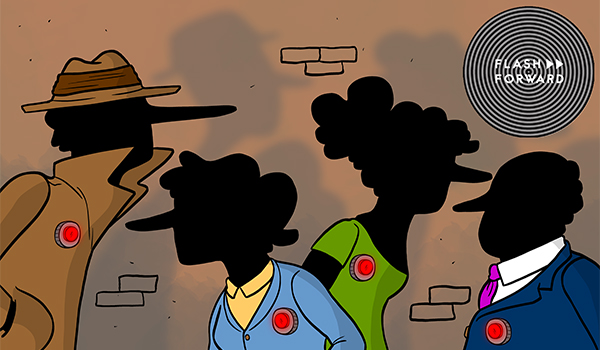
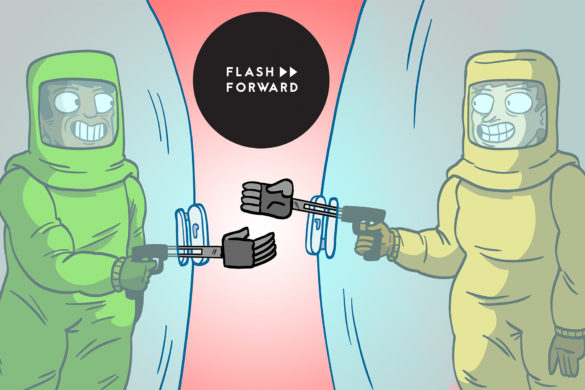
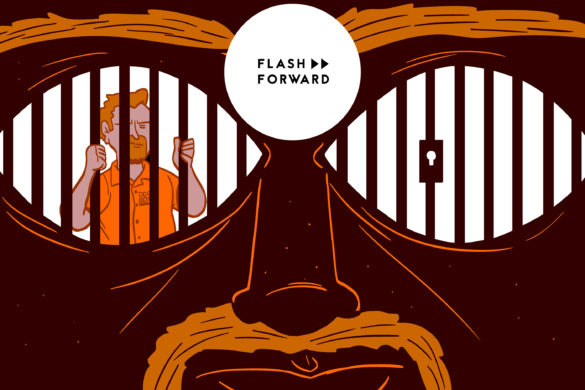
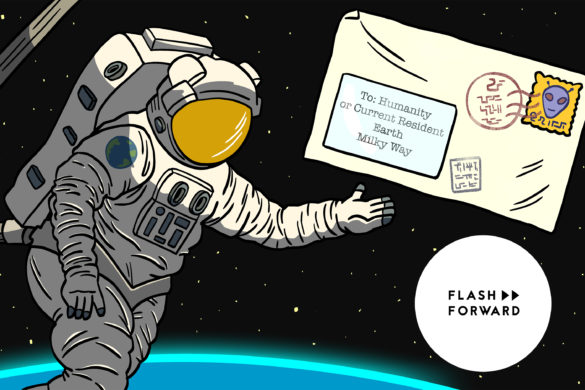
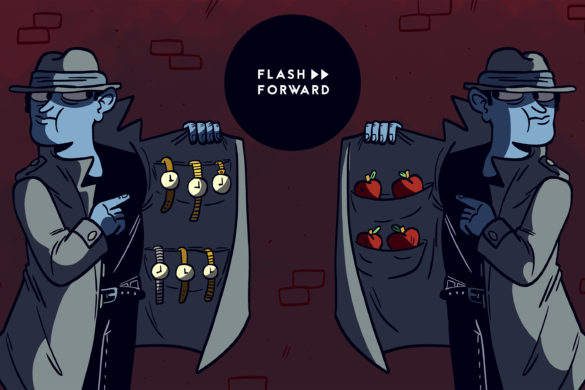
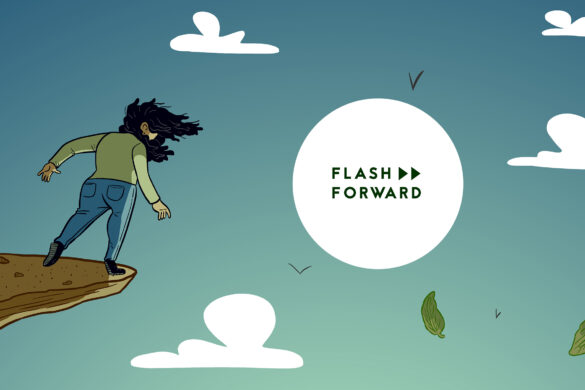
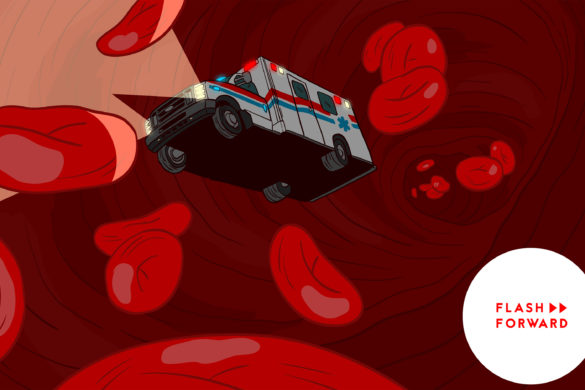
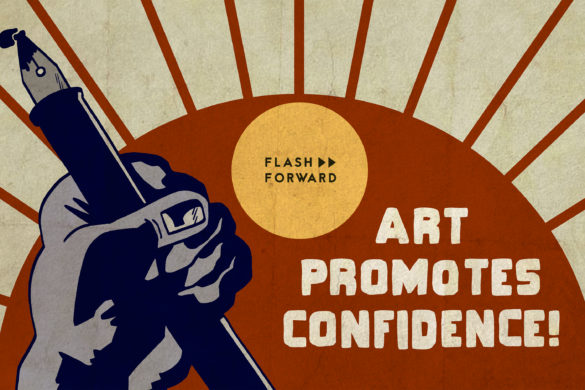
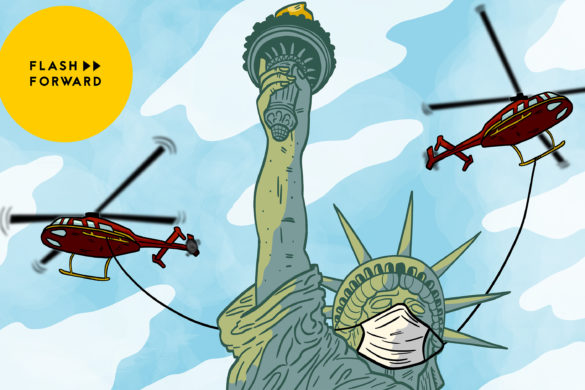
10 comments
[…] ▹▹ Full show notes […]
[…] ▹▹ Full show notes […]
[…] ▹▹ Full show notes […]
[…] ▹▹ Full show notes […]
[…] ?? Full show notes […]
[…] ▹▹ Full show notes […]
Lot of the downsides assume we are all unused to hearing the truth. Like ending a phone call: “I think I want to go now” (with more info or without) works quite well. If they know you cannot/will not lie, and you enjoyed the phone call, you can even say “It was a lovely call.” and they’ll know you mean it! It’s amazingly fun and simple, really.
When it comes to things like surviving in dangerous situations, a lot of dangerous situations are build with lying by the hostile person: “I’m a nice guy” and “I promise I’ll go after getting a glass of water”, which also would be done away with.
There is a wonderful book called Lying, by Sam Harris. I wholeheartedly recommend it.
I’m somewhat taken aback about the “Hi, how are you” scenario. I always ask because I’m interested. I have a great deal of difficulty saying anything but the truth when people ask me how I am. In short, I pretty much do not understand the necessity of social lubricant lying.
As far as body language, micro expressions, and other tells are concerned, I agree that these are not foolproof. However, coupled with logical consistency checks, vocabulary checks, and tonal inflections, you can get a pretty good idea that what a person is saying is not necessarily what the person is wanting. For example, I find that the more hyperbolic the language is, the less likely there is truth to the statement. I find that when words are chosen to engender an emotional response rather than a thoughtful response, the speaker of those words has less than honest intent. For example, read PAC solicitation letters, then dissect the sentences, and finally track down the facts (or non-facts) behind the statements. In many instances, the underlying facts are much less dire (if not outright contradictory) than the statements made in the PAC letters.
The above could explain a lot of things about my (lack of) success when interacting with people on a social level. And I will not lie . . . that lack of success is unpleasant.
If had a little box, and it beeped every time I told even the tiniest of falsehood, does this box also force the person being lied to to care? I think most lies are detected at a subconscious level — at least the small talk sort of lies. I think eventually that beeping would just become part of the background noise.
[…] Leader: A conversation with Ryan Hawk. Writer Files: A conversation on writing with Kelton Reid. Flash Forward: A conversation with the talented Rose Eveleth at BoingBoing. Roger Dooley: How to be a white hat […]